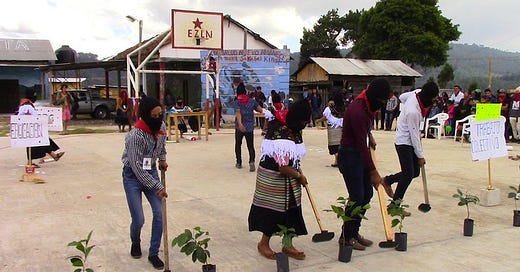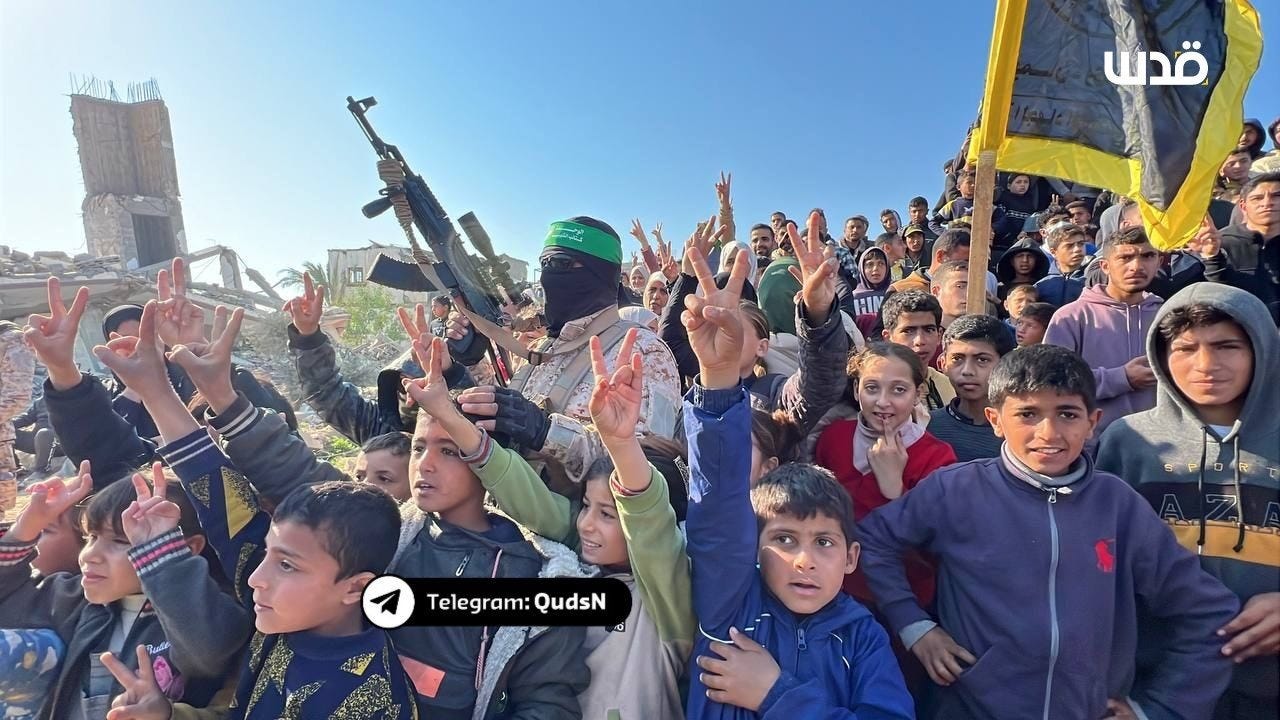Build Something Worthy of Defending: Organization vs. Mobilization
Follow-up and key concepts from Dr. Mohamed Abdou’s session #2 (February 4, 2025)
Welcome back to our new column called Ask Me Anything “Middle East” with Dr. Mohamed Abdou, a distinguished North African-Egyptian scholar-organizer.
This column is a basis for foundational knowledge for understanding and analyzing geopolitical dynamics through the lens of transnational liberation movements. This monthly column is derived from our accessible Ask Me Anything Zoom sessions, which is open to all members of our community each month.
In last month’s inaugural column, we delved into several thought-provoking topics:
The Eurocentric nature of the term “The Middle East”
The concept of Orientalism
The significance of settler-colonialism and the pivotal year 1492
The imperial boomerang theory.
In this month’s column, we dive into the following:
Organization vs Mobilization
Practical questions for revolution
Organized few vs mass mobilization
Building Alternatives
Zapatistas
Black Panthers
Local and transnational examples
A note from the Professor:
Salam alikum & Shalom alechiem everyone. Thank you all for joining us during the last AMA, and for sharing your questions, your reflections and your thoughts as we build community together. I’m deeply humbled and honored that you all came and I look forward to our further collective unlearning and relearning. I pray it was a useful engagement and I look forward to our next AMA. Please don’t ever hesitate in keeping in touch and let me know if there’s any way to support your loved ones, community, and any of you.
To sign up for the next session on Tuesday March 4th you can register here. If you have questions or thoughts, please don’t hesitate to reach out to me directly over social media or via email to myself and the team I work with at wearemohamed1492@gmail.com.
Yours and our just movements,
Mohamed
Dua from the Quran of the Prophet Musa (Moses) before he spoke to Pharaoh
Oh creator, open thy breast
and make my affairs easy
Undo the knot in my tongue
Such that what it is that I have to share with you becomes accessible
and reaches your hearts, ears, and souls
Topics Discussed this Month
Topic #1: Organization vs. Mobilization
The difference between organization and mobilization is crucial, and it’s a concept outlined by Kwame Ture.
Blocking of things, disruptions, boycotts, barricades, marches, protests . . . That’s all well and good but it’s not building, not creating what comes next. It’s strictly mobilization, which manifests in a seemingly endless rhythm of causes. That’s not constructing alternatives on the land and with the people where you’re situated. Mobilization addresses issues and organization addresses structures and the building of alternatives.
Revolution is about practical questions. What are you going to do when someone gets hungry? What are you gonna do when someone gets sick? What are you going to do about childcare? What are you going to do with the nuclear power plant? When something happens, what is the recourse? What’s the alternative life going to look like?
In Kingston, Ontario, Canada, we built a social center and it took us 10 years to build. Living quarters, music room, public library . . . and the same project in Oaxaca. This is the creation of alternatives, and it’s not easy. How do you establish alternative schools, alternative everythings? In the gentrified neighborhoods? How do you protect it so that police can’t walk into the new neighborhoods? How do you establish qualifications of a new society in case there’s assault etc, how do we work through it? How do we extend that to our prisoners? This is what it becomes. This is what it needs to evolve to. How do you do that without land? And in the case of settler-colonies like so-called US and Canada, without Indigenous people who have sovereignty over land in the sense of a mutually constitutive relationship with it?
This is not about numbers. Moses and the Jews were not about numbers when they defied Pharoah, when they crossed the Red Sea. The Panthers were not large in numbers, the Zapatistas, Malcolm, Martin . . . None of these movements were about numbers: They were about the organized few. This is what freaked out the Euro-American Alt-Right wingers during Al Aqsa Flood: Look what 1,000 resistance fighters/Mujahadeen did insofar as upending the entire world. You had fleets, aircraft carriers, F35s, F16s, all the weapons of the world, nuclear submarines — from Euro-America! All sent for who? For Gaza! All this for Gaza? 1,000 people? So it’s not a matter of numbers. The Quran always says, “how the smaller group can defeat the larger enemy.” (Ch 2. Chapter of the “Cow”: Verse 249).
In the words of revolutionary Kwame Ture:
“We say that we must come to know the difference between mobilization and organization because the enemy will use mobilization to demobilize us. Mobilization is very easy. Very, very easy. Since we are a people who are instinctively ready to respond against acts of injustice, any time there’s one little act of injustice, we can blow it up and we will find people who will come and make some mass demonstration around it. ‘Ms Sally lost her job, let’s rally, she’ll get her job back.’ People will come and rally. ‘So and so got kicked out of school because the teacher’s unjust.’ Unjust, the people will come and rally. They will come to rally at issues.
“And this is what mobilization does, it mobilizes people around issues. Those of us who are revolutionary are not concerned with issues, we are concerned with the system. The difference must be properly understood. The difference must be properly understood. Mobilization usually leads to reform action, not to revolutionary action.” — Kwame Ture
Topic #2 The Building of Alternatives
I not only believe in ending the Zionist entity but also the American entity, the “monster in the mirror” so to say — but what my detractors don’t understand is that transnational decolonization and abolition are not about destruction, they’re about the creation and building of alternatives.
Ending the religious settler-state means divesting from its structures and investing in building alternatives on the land on which we are situated. Build on the land and grow food as everything collapses. Build something worth defending. And to reiterate: How can you do this without Indigenous people, the rightful stewards of this stolen land?
Example 1: The Zapatistas
The Zapatistas operated for ten years in silence in the Lacandon Jungle before announcing themselves on the scene. On January 1, 1994 they emerged and declared themselves at war with the Mexican state. They built schools, co-operatives, Indigenous means of healing, a military . . . They teach us to build something worthy of defending. The left needs to shut up and go underground and build. Or even build in plain sight: A community garden, a community building. Intentional communal spaces which are beyond what we individually own. Create something collectively to defend. We didn’t build the schools and the hospitals in our communities, the religious settler-state built them: What have we built on our own using our collective resources that we can pool together? This is the work that must be done.
Example 2: The Black Panthers
The Black Panthers had free breakfast programs, free schools/education — similar to the Zapatistas — on the ground. Education is the most fundamental tool of consciousness that one can bring about for the generations. The crusading settler-state steals education and they steal not only history but dreams — and worlds where all worlds fit. The Black Panthers were in the gentrified neighborhoods organizing, mobilizing, and educating. They built alternatives and took care of the needs of their community members which made them a tremendous threat to the state. Simultaneously, the Black Panthers armed themselves to defend what they had built. They were deemed dangerous because they were not only mobilizing (protest, demos, etc) but organizing alternatives to the settler-state.
Example 3: Various local and transnational movements and spaces
Decolonization means drawing from inspirational thinkers, organizers, and movement alternatives such as those mentioned above as well as many others including La Vía Campesina. Temporary, semi-permanent, and even permanent autonomous initiatives that re-situate our relationship to land are prevalent since the Seattle 1999’s anti-globalization movement and manifest themselves in “squatters’ movements, social centers, Indigenous collectives, land-reoccupation [and decolonization] movements. This includes formations such as alternative media centers, communes, activist media networks, and physical communal spaces built on the land. Examples of two such projects that are near and dear to my heart are Medicine for Nightmares in San Francisco and Pass on Press in Berlin.
Sustainable, alternative ways of living and resistance are also embodied in historical ruptures like the Paris and Canton Communes, the anarchists of Catalonia, movements like the 1936 Mujeres Libres up to more recent examples of these insurrectionary revolts rising up against capitalist-states that also include the Mapuche Indigenous people’s struggle in Patagonia, Argentina, the APPO teacher’s uprising and Oaxaca Commune of 2006 in which Oaxaqueños took over the entire province of Oaxaca, Mexico for six months, and organized urban land-based autonomous ways of living that outlived and superseded the initial Tahrir Uprising’s 18 days in Egypt.
If you’re interested in further learning, below are a few links to recent talks I did in Berlin and San Francisco:
Dreaming Dangerously Beyond the Nation State; Qur'an of the Oppressed, Decolonization, and the Land @ Medicine for Nightmares (San Francisco) 2/11/25
1492: Islam & Anarchism w/ Pass On Press (Berlin) 1/11/25
1492: From Turtle Island to Palestine w/ Dr. Anna Younes (Berlin) 1/15/25
And please join us for our next Ask Me Anything Zoom sessions — open to each member of our community each month.
Our next sessions take place on:











Mobilization vs. organization just explained why we're all exhausted and nothing's changing. While we're perfecting our protest selfies, the Zapatistas spent a decade building entire communities before anyone knew their names.